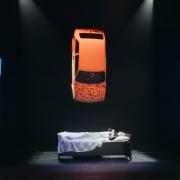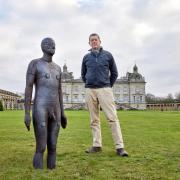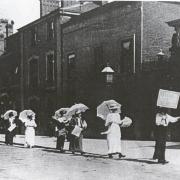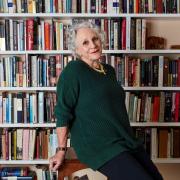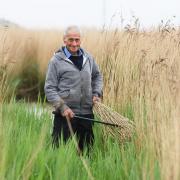Norfolk’s D-Day heroes return to Normandy for the 75th anniversary this month. Stacia Briggs tells three extraordinary stories

They are a dwindling brigade of old soldiers: the young men who once nervously waited for the signal to move forward on D-Day are now edging towards the grand age of 100.
Seventy-four Normandy summers and a lifetime have passed since soldiers appeared on French beaches like a surprise storm, running towards a barrage of mortar fire, smoke and uncertainty to play their role in the liberation of France and the decisive battle that foreshadowed the end of Hitler's dream of Nazi domination.
Every year, a hardy band of brothers makes the pilgrimage to France to remember those they had to leave behind, the comrades who fell in the battle for freedom, a campaign which marked the beginning of the end of the Second World War.
Among them will be Norfolk's D-Day heroes who are still fit enough to travel: blue-blazered veterans no longer parade through the streets of France in their hundreds before a ceremony or service - it is estimated that fewer than 500 British veterans are still alive and only a handful will be travelling to Normandy this year to mark the 75th anniversary of D-Day.
On June 6, 1944, Allied Forces from Britain, Canada and America landed on the beaches of this beautiful region to liberate the French from their four-year occupation by the forces of Nazi Germany.
Serried ranks of ships, gliders and planes disgorged 156,000 Allied soldiers on to the beaches of northern France and by the end of what became known as The Longest Day, many had paid the ultimate price for our freedom.
Today, the newest battle is to preserve the memories of those who fought in northern France and were transformed by one devastating, yet triumphant, summer before they are lost forever.
Here are just three stories of unimaginable bravery.

- Len Fox, Despatch Rider, Royal Service Corps
Len, who lives in Norwich, returns to northern France every year to remember comrades who were lost, a battle that turned wet-behind-the-ears boys into men in a matter of hours and to make a poignant return to the short stretch of sand that, 75 years ago, felt like a boundless desert to a heavily-laden man with a pounding heart.
On D-Day, Len had watched from his ship as all hell let loose on Normandy's beaches, waiting for the word that would unleash him into a maelstrom of shells, bullets and danger. Less than 20 years old, Len was a long way from Norwich.

Len's army papers arrived on July 1, 1943. He was 18. After training in Blackpool, he was sent to Hereford for unit selection and later posted to Basingstoke on a Royal Army Service Corps course, where he was taught to drive and became a motorcycle dispatch rider.
On June 5, 1944, Len and his comrades went to Tilbury Docks in London where they prepared to set sail before action was postponed. After another restless night at the racecourse, it was back to Tilbury where Len joined an American Liberty ship and was issued with seasickness pills.
"On the way over we were all sick due to the rough sea. On arrival we were offered food by the ship's crew but none of us could eat as we looked at the most awesome sight and sound imaginable. Warships, troopships, barges, landing craft, inshore rocket craft, planes overhead, barrage balloons, all hell being let loose, the noise bursting my ear drums.
"As a 19-year-old it was the nearest thing to hell I'd ever seen, and that's where I thought I was."

Arrving in France, the lorries from the ship were winched on to a Rhino barge and Len climbed down a rope ladder. Soaked to the skin, he watched as the ramps on the barges were lowered and the trucks drove on to the beach.
"Mines were exploding everywhere and one of our trucks was blown up, killing one of the lads from our platoon. While all this was going on, Jerry was 'stonking' (shelling) the beach with mortar and artillery fire," said Len.
"When I got to the beach, there was a beach master who was telling us in no uncertain terms to get our backsides off the beach as quickly as we could. When I was running across the beach we were being stonked by German artillery. I nearly tripped over a German helmet on the beach - when I looked down, his head was still in it. It brought home to me - this is what war is about.
"I remember looking down at the coastline and there was a red line all the way across as far as you could see. Along the edge of the beach there were body parts on the sand and floating in the sea, the tide was red with the blood of those lads that didn't make it. It made me feel quite sick."

A father of three and grandfather, for more than 30 years, Len has returned to Normandy to honour those friends and comrades who never came home.
"Sometimes I think to myself 'was it worth it?' Three of my friends who were blown up at the crossroads are buried in Bayeux and I don't think I could cope if I thought it wasn't worth it. We have to think of how important the Normandy campaign was in the course of the war," he said.
"People call us heroes, but we weren't heroes, we were doing our job. The real heroes are the ones that lay in the ground in France."
- Len Mann was 19 when he landed on the beaches at Normandy, serving in the 12th Battalion Devonshire Regiment
"I should have gone over in a glider for D-Day but there weren't enough and so I had to go by boat. I was in the Channel for six days and it was absolutely terrible: the sea was really rough, there were waves coming over the boat, it was awful," he said.
"On the fourth day, we were told it was all off. On the fifth day, we were definitely going again. On the sixth day, we went. I landed on the beach at Arromanches at around 7am on June 6.
"Luckily for us, the Navy and RAF had knocked out the big gun emplacements and we were able to just walk on the beach with no opposition. We made our way to Ranville, all the time with planes strafing us.

"I went in with the idea that if I got killed I wouldn't know anything about it. When we went to attack Breville, 162 men were killed in five minutes and there were just eight left in my platoon.
"It was terrible. We got caught up in our own shell fire. Some shrapnel went into the back of my head and my family were sent a letter telling them that I was missing with gunshot wounds to the head. I expect they had a shock when they received a letter from me!

"They wanted to keep me in hospital, but I wanted to get back to my mates. We all looked after each other the best we could, we were family. I still think about my company commander who got shot a few yards in front of me and died in the arms of my sergeant. Today, people come and say thank you to me and I say: 'well, we had to do it. If we didn't, they would have been over here.
"We have to remember and respect the lads that were killed out there, who never came back to their families and who made the greatest sacrifice of all."
- Jack Woods is secretary of the Norwich and District Branch of the Normandy Veterans' Association. He served with the 9th Royal Tank Regiment
"I landed on June 19, 1944 - the allies were well-established by then but were being held up by German forces. We were in action for the battle for the Odon River and the capture of Caen - I'd never been into battle before, but I was ready to do what I had to do," he said.
"I was violently sick on the way over and would have done absolutely anything to get off that boat. I remember one of the first things I saw was a German infantry patrol lying dead right across the road - I wondered how it could be justified that these young men had been slaughtered. It seemed like madness.
"When you're 18, being allowed to drive a tank is absolutely brilliant - it's almost like having a massive toy to play with. But when you have to drive that tank in action, it's a different story altogether.
"Every time you moved into attack you had no idea what you'd come up against. There wasn't time to be frightened then, but when you had your days off, that's when the fear kicked in and you knew you had to do it all over again. Anyone who says they weren't frightened is lying. It's a terrifying prospect - the first time you go into action is the best because you don't know what to expect.
After that, you knew and you were frightened.
"When I was on rest days, I'd just pace about and wait and wait for the word. Your greatest fear was being burnt alive inside your tank - really, they were like huge steel coffins. After Caen, we were involved in the crossing of the Orne River and the crossing of the Seine which was crucial to ending the Battle of Normandy.
"I'm lucky - I don't have the flashbacks any more, but some people do; they still have nightmares, they still scream in the night. They can't forget what they saw."
Jack spent the rest of his war in Le Havre, Dieppe, Arnhem, the Ardennes, Roosendaal and the corridor to the Rhine, in Holland, Belgium and in Italy. But his experiences in Normandy have never left him and call him back to the French beaches every year. He will accompany the remaining handful of Norfolk D-Day veterans who are still able to make the journey to France to remember the comrades they left behind.
"I will go back every year while I'm still able," he said, "I have to. I know that when I am back there, my friends are back there with me. I feel them beside me. They may be dead, but remembering them keeps them alive. When we were there, all we wanted to do was come home, but now we need to go back."
He is determined that the legacy of the remaining veterans will be to ensure the continued commemoration of the men and women who fought in the brutal battle for freedom.
"While we are here, we can shout about it, but what happens when we are all gone?" he said. "One day, soon, it will be our memory that needs to be kept alive. Every year, there are fewer of us returning to Normandy, but when we're there we're still the same young men we were then. Sticking together, fighting for each other.
"We won't be forgetting the people unable to make the trip, the veterans who are too frail to make that last journey. They will be a vital part of the anniversary, just as they were a vital part of what happened on D-Day. We will go to Normandy for those too frail to travel themselves and to remember those who never came home. Anniversaries come and go, but we will never forget, Normandy is with us every day of our lives."




